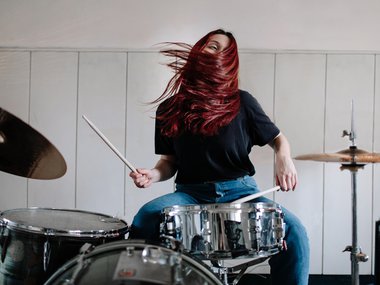Music’s impact on the brain has been studied for years now. Simply listening to music increases blood flow to the regions of our brain that involve emotions. The limbic system, where our brain processes memory and emotions, becomes very active when our ears hear music. We all know the right piece of music at the right time can make you feel like you’re falling in love or get you hyped for a night out on the town, but what impact does it have on reducing pain?
In a recent study, researchers explored that exact question by using classical music composer Wolfgang Amadeus Mozart's song Lullaby as the music newborns would hear right before getting pricked by a needle on the heel for the first time ever.
All of these infants were given a sugar solution as a standard non-drug method of minor pain relief 2 minutes before the heel prick. Then, half the participants were given 20 minutes of Mozart before the heel prick, and then for 5 minutes after. The second group was given only silence.
Before we dig into the results, let’s look at how these researchers approached measuring pain in newborns. Essentially they took a few different reactions from the newborn and applied a 0-to-7 standard pain index. Zero means showing signs of no pain and seven being very obvious they were feeling pain. The variables involved here were things like crying, moving around, breathing patterns, facial expressions and levels of alertness. Each newborn’s reaction was then ranked from 0–7 by the researchers. So what was the result? Did Mozart’s Lullaby make any difference at all?
Actually, yes, quite the difference. The babies who were given the Mozart treatment before and after the heel prick all were observed to display lower signs of pain. On the 0–7 scale, babies listening to Mozart showed a median pain index of 4 during the heel prick, and then dropped to zero two minutes after the procedure. The non-Mozart listening babies showed a median pain index of 7 during the heel prick, and then still scored a 2 on the pain index two minutes after the procedure.
So, what's happening? Other studies with adults have shown music helps reduce pain by engaging sensory pathways that compete with pain pathways. The portion that deals with pain specifically would be competing for energy and neural connectivity. This means that while music is playing, the brain has more to process and can’t put all its neural energy into just the pain portion, thus reducing the amount of pain we feel. In other studies, scientists have also looked at the levels of volume of sound and pain reduction.
This was a small study with only a hundred infants so more research is definitely needed to see how music could potentially be used to help reduce pain. After all, Mozart and Metallica are two pretty different types of musical experiences. Would they both reduce pain? There are still many more things to dig into here before we have a conclusive answer, but the good news is this could be a low cost, non-invasive and potentially fun way to address some pain-related therapies.
Parting advice: it’s probably not a bad idea to put on some Mozart while paying your monthly bills! Who knows, you might hurt a little less.


